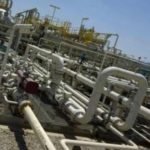The Nigerian National Petroleum Corporation (NNPC) is taking measures to bring down cost of crude oil production to $10 per barrel or below, the Corporation’s Chief Operating Officer (COO), Ventures and Business Development, Mr. Roland Ewubare, said on Friday morning.
Nigeria has been hugely affected by the crisis that hit the oil market as a result of Covid-19 pandemic and price war between two oil giants, Saudi Arabia and Russia. The crash in oil prices forced Nigeria to revise its 2020 budget, as well as the oil price benchmark for the budget due to decline in revenue.
In March, while speaking about the slump in oil prices following Saudi Arabia and Russia oil price war, the Group Managing Director of the Nigerian National Petroleum Corporation (NNPC), Mallam Mele Kyari, said that Nigeria has high cost of production compared to its counterparts. He also said that Nigeria has 50 cargoes of oil seeking for landing.
According to Kyari, the cost of oil production in Nigeria is $15 – $17 per barrel for onshore production whereas deep offshore production costs $30 per barrel. He pointed out that, it costs Saudi Arabia $4 – $5 on average to produce a barrel of oil.
He explained that the high cost of oil production in Nigeria puts it at competitive disadvantage. In April, it was reported that Nigeria banner oil Bonny light, sold below $10 per barrel.
Read also; Commodities Export Business Risks
The COO Ewubare explained that, issues such as pipeline vandalism and crude oil theft, among others, were some of the factors peculiar to the Nigeria terrain that drive up crude oil production cost in the country.
He, however, stated that NNPC was looking very closely at such variable as logistics, security and transportation with a view to reducing cost of production to $10 and below per barrel. He added that the main cost contributor which is the contracting cycle has been reduced, saying that the National Petroleum Investment Management Services (NAPIMS) achieved a six-month contracting cycle.
NNPC Group Managing Director, Mallam Mele Kyari, in a recent interview advanced a similar position where he stressed that NNPC was working assiduously to bring down the cost of crude oil production to not more than $10 per barrel by 2021.
In its effort to curtail the free fall in oil prices, OPEC+ agreed a record deal which will see oil production reduced by 9.7 million barrels per day in May and June.
Read also; Baker Hughes Rig Count for May: Worldwide Rigs Drop by 338
According to the production cut deal, Nigeria is required to produce 1.412 mb/d till June 30, 2020, and increase production to 1.495 mb/d between Jul 1 – Dec 2020. From January 2021 to the end of April 2022, the country will increase production to 1.579 mb/d
Nigeria and Iraq were reported not to have complied with the production quotas from OPEC. The two countries are being asked to pump less than their quota in the coming months to make up for producing too much in May, according to people conversant with events at OPEC..
The Minister of State for Petroleum Timipre Sylva in an apparent response to this development, released a statement on Twitter handle @HETimipreSylva on Tuesday 2nd June 2020, stating that the country’s production in May was 1.613 mb/d down from the 1.829 mb/d base production level, a compliance level of 52%.
He went further to say that current daily production is well below the period commitment level of 1.412 mb/d, and will translate to full compliance by the end of June 2020.
Read more; Saudi, Russia agree oil cuts extension… Nigeria, Iraq and co. fail to meet their obligations
However, when this question of non-compliance was put to Ewubare, he responded by saying that “There’s some confusion in the market around the parameters for the production cuts. Nigeria has a full production capacity of about 2.3mbpd. We are currently producing between 1.6 and 1.7mbpd. Our OPEC quota as a result of the cuts is about 1.4mbpd.”
“You and I know that condensate is not included in the computation of the cut numbers. So, what we have is 1.4mbpd of crude oil. The little you see above 1.4mbpd is made up of condensate which does not count as part of the basis for assessing our OPEC quota”, Ewubare clarified.
Written by;
Ifunanya Ikueze






















































